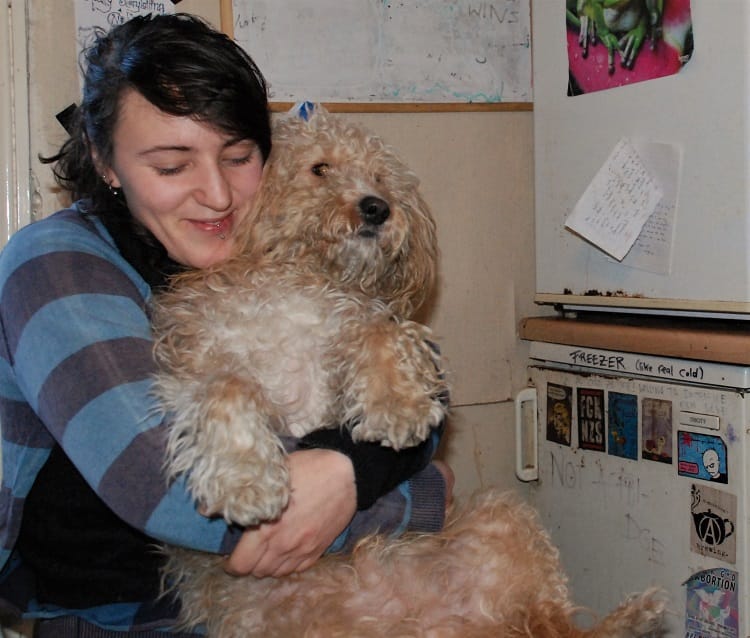What’s the best way to tell area residents about plans for a new asylum shelter nearby?
The government should tell communities directly about plans for new asylum shelters, some activists and politicians say.
Since discovering the art of fermentation in 2015, Indigo Micciche’s been experimenting with all kinds of ingredients. Now Micciche’s ready to share recipes.

Indigo Micciche’s cupboard is now a fermentation station, full of Kilner jars of sauerkraut and kimchi, parsnips and broccoli.
Micciche only learnt the arts of pickling and fermentation in 2015 at the Barricade Inn squat on Parnell Street.
It was there that someone showed them – Micciche identifies as gender non-binary – how to ferment all manner of produce, to pickle vegetables and create kombucha.
Since then Micciche, who is now sharing a house with seven others, has been perfecting recipes and experimenting with ingredients.
Next Thursday, 2 February, they will kick off a series of fermentation workshops at the Dublin Food Co-op in Newmarket Square, with eight weeks of chopping, cooking and pickling.

Trial and Error
First tip: there’s no point in breaking the bank when it comes to ingredients, says Micciche. Fermented foods are simple. They’re also cheap and they last.
“Some of my stuff’s wild, some of it’s from my garden. I dumpster dive a lot of my food so that’s good for the house … Oh, does anyone have a hundred apples? I’ll make something with that,” says Micciche. “But for the course I’ll buy from the food co-op.”
A lot has been learnt through trial and error, says Micciche, chewing on a stick of raw liquorice. Sauerkraut, for instance, ferments in the cabbage’s natural juice. Sprinkled with salt and stuffed into a Mason jar, it only takes a few days for the tangy snack to be ready.
“We have a lot of travellers come through our house so, for example, I was making sauerkraut for ages and calling it kimchi,” says Micciche. “And then I’d a Korean woman stay in my house and she was like, ‘Oh, no no no. This is not kimchi!’ ”
Micciche is originally from England, but she packed up as a teenager to travel, and has been in Dublin for two years.
One day a week, they’ll try a new experiment or check up on the stash in the hallway cupboard. The ingredients for the most recent addition – a dandelion-and-burdock drink – were picked along the nearby Royal Canal.
For last Christmas, Micciche mixed chilies and vinegar to make a sauce, adding a heap of sauerkraut juice for extra zing.
“It’s so good. I made that for my dad for Christmas,” says Micciche, snickering. “I travelled with it but it burst! It literally exploded on his face and all over the floor.”
Another time, when making an Indian pickled chili sauce, Micciche and a friend went all out with the heat. “They were the hottest chilies I’ve ever tried,” they say. “We ended up blending them to make a ghost chili sauce. So you add one drop and your meal is red hot.”
Micciche says there was no point in putting on an unaffordable food course.
The eight weeks come in at €120, or €20 a class. But if money’s an issue Micciche says, by all means, you can offer to chop and prep in exchange for a reduced rate. A reduced rate is also available for students, refugees, and the unemployed.
As much into cooking as fermenting, Micciche’s course won’t be solely focused towards the fermentation end of things.
It wasn’t hard to design the course but, given the time of year, not all of the ideal fermentable ingredients are available. Week one, which starts on 2 February, is an introduction to fermentation and includes a lesson on how to make ginger bug, a fermented soda.
Root beer, sauerkraut, kombucha and water kefir make up the next four weeks. Fermented chili sauce and sprouts feature in weeks six and seven.
The course concludes with learning how to make raw chocolate. “It’s really easy. It’s cocoa, sweetener and a fat. I use coconut oil,” says Micciche.
“That’s it really. Then you add loads of [different flavours] to it and you put it in the fridge or the freezer and then you’ve got raw chocolate. It’s dark. It’s really dark. You can make hot chocolate with it … Oh yeah,” they say.
Micciche will provide the ingredients for each class, and those who attend get to take home what they’ve made each week, along with a recipe book.
For Micciche, fermenting is therapeutic. “I started doing it more and more. I really got passionate about it,” they say. “If I’m having a bad day or something I’ll be in the kitchen, or in fermenting.”
The upcoming course will add a more communal slant to a so-far solitary hobby, they said.